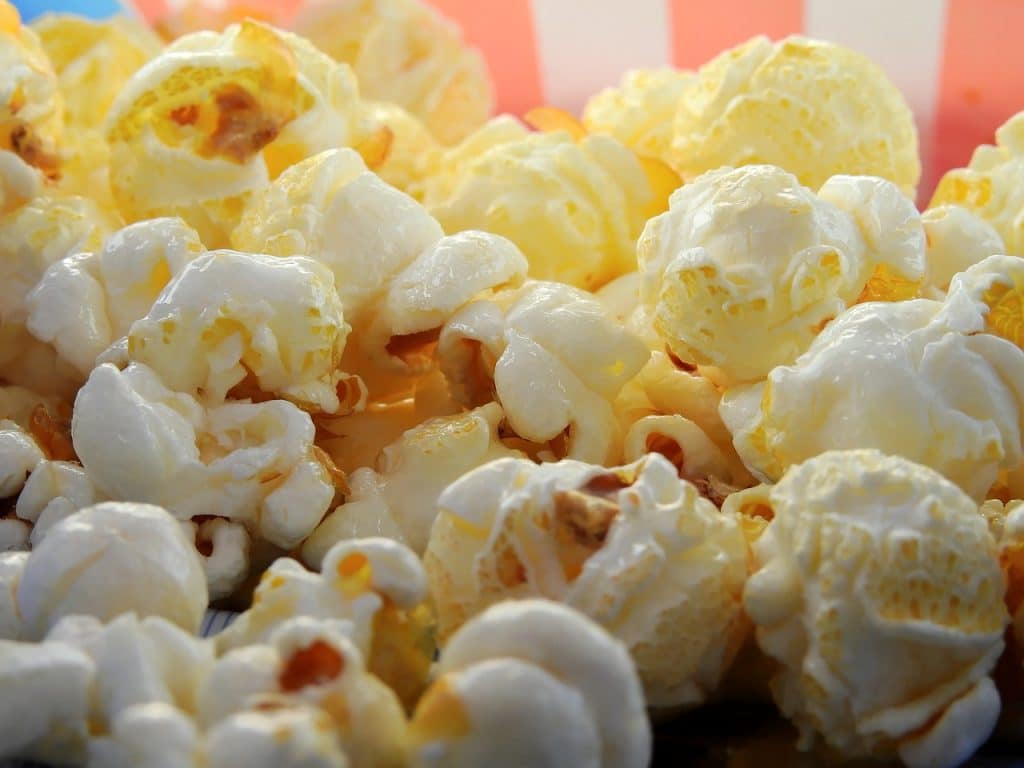
Popcorn and gout: You love popcorn, but you’ve discovered you’ve got gout. Can you continue eating popcorn or should you stop? And even if you can should you be eating it anyway?
Is Popcorn Safe to Eat When You’ve Got Gout?
Gout is an inflammatory type of arthritis caused by higher-than-normal levels of uric acid in the bloodstream out of which monosodium urate crystals can form in the joints and surrounding tissue.
Uric acid is a byproduct of the metabolic breakdown of natural compounds called purines which exist in our body’s cells and in the the cells of the food we eat.
Around 30 percent of uric acid in the body is produced from the food we eat so we need to carefully consider which foods we consume, as different foods have different purine concentrations.
Purines in Popcorn
Since it’s a whole grain, plain popcorn is considered to be low in purine: less than 100 mg of uric acid produced per 3.5 oz (100 g) serving of popcorn.
As far as its purine content is concerned, then, popcorn is safe to eat with gout.
Of course, that doesn’t mean devouring a ton of it in front of the TV every day; that’s just stacking up your total daily purine intake unnecessarily.
Remember, popcorn isn’t a meal, it’s an occasional snack.
So popcorn is fine as a snack with gout, but is it healthy? Should you be eating it at all? Let’s take a look…
What is Popcorn?
Popcorn has been around for many thousands of years. Archaeologists in New Mexico found evidence of popcorn which was carbon-dated back to 3600 BC, quite possibly making it the world’s oldest snack!
Fast forward to today and there a 6 kinds of corn being cultivated: dent corn (aka field corn), sweet corn (aka corn on the cob), flour corn, pod corn, flint corn, and popcorn.
Popcorn is subvariety of flint corn. It’s scientific name is Zea mays everta and it’s the only type of corn used in making popcorn since it’s the only type that consistently pops and expands to 20 to 50 times its original size when heated. Popcorn also has a distinctive flavor.
Most of the world’s popcorn is grown in the Corn Belt of the United States. But it’s also cultivated in a number of other countries such as China, Brazil, Argentina, Ukraine, and India, even in the European Union.
What Makes it Pop?
A dried popcorn kernel consists of a very hard outer shell called the ‘bran’ or ‘hull’ which totally encases a plant embryo, a starchy endosperm and a small droplet of trapped water. The endosperm and water feed the plant embryo.
When heat is applied the water starts to turn into steam, increasing the pressure inside the kernel. As the temperature and pressure increases, the starch in the endosperm starts to gelatinize.
When the hull eventually ruptures, the high internal pressure is violently released allowing the steam to very rapidly expand through the gelatinized starch turning it into an airy foam that keeps expanding to such an extent that the kernel is literally turned inside out. As it quickly cools the hugely expanded starch solidifies leaving the white fluffy snack we know and love.
How Healthy is Popcorn?
Popcorn, being a whole grain food, has a relatively low glycemic index (55). Source. Low glycemic index diets have been linked to reduced risks for conditions such as heart disease and cancer.
Popcorn contains zero cholesterol, is low in calories, low in fat, and very high in fiber — which helps to maintain bowel health, stabilize blood sugar, and may even reduce the risk of obesity.
It’s also rich in some essential nutrients:
Vitamins
- A
- E
- K
- thiamin (B1)
- riboflavin (B2)
- niacin (B3)
- pantothenic acid (B5)
- pyridoxine (B6)
- folate (B9)
Minerals
- iron
- zinc
- magnesium
- manganese
- potassium
- copper
- calcium
And that’s not all, popcorn contains polyphenols: natural compounds found in plant foods with antioxidant properties that may help to fight free radicals in your body. Free radicals are linked to diseases like heart disease, diabetes, and some cancers. It’s thought that the regular consumption of polyphenols may protect against such diseases.
It’s also believed that polyphenols may boost digestion and brain health (e.g. memory, learning, and concentration).
In addition, popcorn contains beta-carotene, luteinc, and zeaxanthin which may help to boost eye health.
Overall, then, popcorn is a healthy snack, although pouring on lashings of butter or adding way too much salt and other additives can cancel-out any health benefits.
Fancy Making Your Own Popcorn?
There are 2 ways to make popcorn: the dry method and the wet method.
Most commercially produced popcorn uses the wet method which entails the use of oil (usually coconut or canola) and clarified butter (or butter flavorings) along with salt and other additives.
The dry method is the much healthier option since it doesn’t require oil or butter or other additives to coat the kernels.
Here’s a short video on how to make popcorn at home using the dry method with healthy seasonings:



